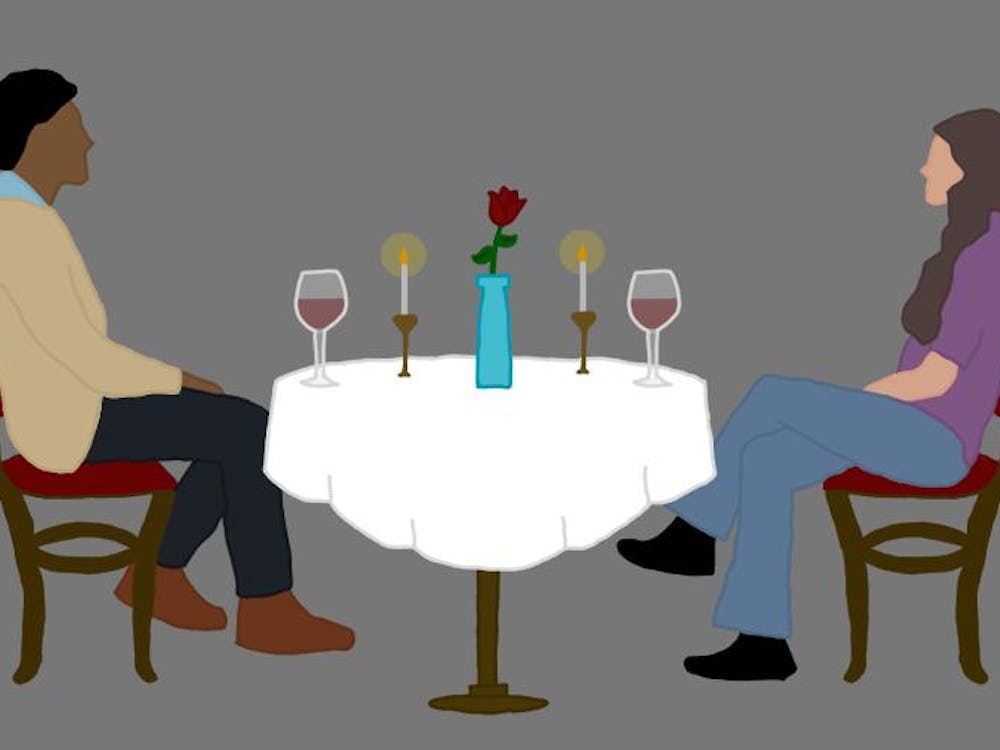Attracting students to the Center
Third-year College student David Reid had fallen in love with the Miller Center. The brilliantly painted walls and elegant curtains were a nice touch, but Reid was impressed especially by the prominent speakers who frequently visited the Center to address a public crowd.
Reid had noticed, however, that the audience was dominated by the elderly. In order to attract more University students to the regular forums, Reid, a double major in government and history, founded the Public Service Dinner Series. The Series allows students the opportunity to have dinner with prominent diplomats, journalists and other public figures visiting the Miller Center through funding from the Center, the Parents Program and the College of Arts & Sciences Council.
"I saw the Miller Center as a wonderful resource for intellects, political scholars," Reid said. "I saw the opportunity to bring students together with these speakers in a casual setting... taking that whole Jeffersonian ideal of faculty-student relationships a step further and bringing it to the national and international community."
With former Ambassador to Moscow Jack Matlock scheduled to address the Center last Wednesday night, Reid solicited dinner invitation requests from students , primarily through e-mail. He then organized a small group to accompany current and former professors and members of the Charlottesville and University community to a free catered dinner following Matlock's speech.
Director of Miller Center Forums George Gilliam said he also has worked to change the crowd's demographics, in part by shifting several forums to the evening because morning forums generally attract low student turnout. Gilliam said although it is a "slow process," his attempts to bring more students to the forums have been working thus far.
"For years, students complained" that they were uncomfortable and not called on for questions at the forum, Gilliam said. "They thought it was kind of an old people's club."
Gilliam noted the older crowd attending the forums -- many visiting from local retirement communities -- also appreciates students who contribute questions at the forums.
"The old people love when the students participate -- they want to know what the younger generations think," Gilliam said.
Reid said he was proud to observe a steady increase in student attendance.
"Students have seen the merit in it... and kept coming back," he said.
Dinner with a Cold War diplomat
Gathered around a long table covered in a white linen tablecloth on the first floor of the Miller Center, approximately 20 people joined Matlock and his wife for a casual discourse on the Cold War, the United States relationship with Russia and modern international politics.
The dinner followed the open forum and Matlock's signing of his book, "Reagan and Gorbachev: How the Cold War Ended."
First-year College student Galina Boyarinova said she appreciated the rare opportunity to dine with the former ambassador and hear a unique perspective of an oft-studied time period.
"It was very interesting because you hear about the Cold War in high school and college and you learn the facts, but it was interesting to get the insider's point of view... the human aspect that you don't get in the textbook," Boyarinova said.
With a handful of University students seated at the opposite end of the table, Gilliam promoted student participation during the dinner discussion by announcing, "the next question must come from someone under the age of 25."
A former ambassador's global perspective
Appointed by President Reagan as ambassador to Moscow in 1987, Matlock served as a close advisor to the president, often playing the role of Soviet leader Mikhail Gorbachev in Cold War simulations.
Rejecting the notion that any of the traditional international relations theories sufficiently can explain the conclusion of the Cold War, Matlock instead described in a narrative fashion the decisions made by the "two principal negotiators," Reagan and Gorbachev.
"We did not set out to destroy the Soviet Union," Matlock explained. "[Reagan's] policy was not regime change -- his policy was that 'the regime you have can change.'"
Matlock said Reagan considered peaceful Cold War periods of détente to be a "one-way street" early in his presidency, but he continued to look for opportunities to negotiate.
"He never attacked the Soviet leaders by name or personality," Matlock said. "He criticized the system, but he always had in the back of his mind" that he wanted to work with the Soviet leaders.
As the superpowers escalated their nuclear arsenals to the point when they had "enough nuclear weapons to extinguish life on Earth seven times over," Matlock noted, several factors prevented the two superpowers from direct confrontation, including a history of alliance and the lack of territory battles. He emphasized Reagan's and Gorbachev's very different backgrounds as he explained that even these two leaders conducted peaceful negotiations, yielding agreements on Eastern European independency and a reduction in the arms race.
"I can think of about one thing they had in common -- incredibly close and mutually supportive relationships with their wives," Matlock said.
Matlock added that despite unwarranted attacks on Reagan for using the phrase "evil empire" to describe the Soviet Union -- the label was uttered once but considered permanent policy -- the Republican Reagan enjoyed approval from Democrats for his Cold War plans. While Reagan was a president who effectively controlled the neoconservatives in Congress, Matlock said, "now we have a president who is used by them."
A dinner guest asked Matlock about modern international politics, and the former ambassador shared his view of the current role of the United States in global relations.
"I don't see us as the world's nanny," Matlock said. "The idea that we'll bring pressure [to other nations' domestic policies]... that's rather ridiculous."
Matlock also ranted about what he considers the unnecessary U.S. policy of keeping nuclear forces on alert, which he related to the larger issue of the nation's role in international relations.
"I have real problems with our failure to deal, particularly with the nuclear issue," he said. "If we use another nuclear weapon, it will be a prelude to them being used against us. We need to show that we are willing to play the international game"






